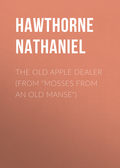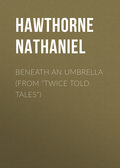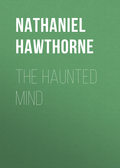
Натаниель Готорн
The Three Golden Apples
“My name is Hercules!” roared the mighty stranger. “And you will never get out of my clutch, until you tell me the nearest way to the garden of the Hesperides!”
When the old fellow heard who it was that had caught him, he saw, with half an eye, that it would be necessary to tell him everything that he wanted to know. The Old One was an inhabitant of the sea, you must recollect, and roamed about everywhere, like other sea-faring people. Of course, he had often heard of the fame of Hercules, and of the wonderful things that he was constantly performing, in various parts of the earth, and how determined he always was to accomplish whatever he undertook. He therefore made no more attempts to escape, but told the hero how to find the garden of the Hesperides, and likewise warned him of many difficulties which must be overcome, before he could arrive thither.
“You must go on, thus and thus,” said the Old Man of the Sea, after taking the points of the compass, “till you come in sight of a very tall giant, who holds the sky on his shoulders. And the giant, if he happens to be in the humor, will tell you exactly where the garden of the Hesperides lies.”
“And if the giant happens not to be in the humor,” remarked Hercules, balancing his club on the tip of his finger, “perhaps I shall find means to persuade him!”
Thanking the Old Man of the Sea, and begging his pardon for having squeezed him so roughly, the hero resumed his journey. He met with a great many strange adventures, which would be well worth your hearing, if I had leisure to narrate them as minutely as they deserve.
It was in this journey, if I mistake not, that he encountered a prodigious giant, who was so wonderfully contrived by nature, that, every time he touched the earth, he became ten times as strong as ever he had been before. His name was Antreus. You may see, plainly enough, that it was a very difficult business to fight with such a fellow; for, as often as he got a knock-down blow, up he started again, stronger, fiercer, and abler to use his weapons, than if his enemy had let him alone, Thus, the harder Hercules pounded the giant with his club, the further be seemed from winning the victory. I have sometimes argued with such people, but never fought with one. The only way in which Hercules found it possible to finish the battle, was by lifting Antaeus off his feet into the air, and squeezing, and squeezing, and squeezing him, until, finally, the strength was quite squeezed out of his enormous body.
When this affair was finished, Hercules continued his travels, and went to the land of Egypt, where he was taken prisoner, and would have been put to death, if he had not slain the king of the country, and made his escape. Passing through the deserts of Africa, and going as fast as he could, he arrived at last on the shore of the great ocean. And here, unless he could walk on the crests of the billows, it seemed as if his journey must needs be at an end.
Nothing was before him, save the foaming, dashing, measureless ocean. But, suddenly, as he looked towards the horizon, he saw something, a great way off, which he had not seen the moment before. It gleamed very brightly, almost as you may have beheld the round, golden disk of the sun, when it rises or sets over the edge of the world. It evidently drew nearer; for, at every instant, this wonderful object became larger and more lustrous. At length, it had come so nigh that Hercules discovered it to be an immense cup or bowl, made either of gold or burnished brass. How it had got afloat upon the sea, is more than I can tell you. There it was, at all events, rolling on the tumultuous billows, which tossed it up and down, and heaved their foamy tops against its sides, but without ever throwing their spray over the brim.
“I have seen many giants, in my time,” thought Hercules, “but never one that would need to drink his wine out of a cup like this!”
And, true enough, what a cup it must have been! It was as large – as large – but, in short, I am afraid to say how immeasurably large it was. To speak within bounds, it was ten times larger than a great mill-wheel; and, all of metal as it was, it floated over the heaving surges more lightly than an acorn-cup adown the brook. The waves tumbled it onward, until it grazed against the shore, within a short distance of the spot where Hercules was standing.
As soon as this happened, he knew what was to be done; for he had not gone through so many remarkable adventures without learning pretty well how to conduct himself, whenever anything came to pass a little out of the common rule. It was just as clear as daylight that this marvellous cup had been set adrift by some unseen power, and guided hitherward, in order to carry Hercules across the sea, on his way to the garden of the Hesperides. Accordingly, without a moment’s delay, he clambered over the brim, and slid down on the inside, where, spreading out his lion’s skin, he proceeded to take a little repose. He had scarcely rested, until now, since he bade farewell to the damsels on the margin of the river. The waves dashed, with a pleasant and ringing sound, against the circumference of the hollow cup; it rocked lightly to and fro, and the motion was so soothing that, it speedily rocked Hercules into an agreeable slumber.
His nap had probably lasted a good while, when the cup chanced to graze against a rock, and, in consequence, immediately resounded and reverberated through its golden or brazen substance, a hundred times as loudly as ever you heard a church-bell. The noise awoke Hercules, who instantly started up and gazed around him, wondering whereabouts he was. He was not long in discovering that the cup had floated across a great part of the sea, and was approaching the shore of what seemed to be an island. And, on that island, what do you think he saw?
No; you will never guess it, not if you were to try fifty thousand times! It positively appears to me that this was the most marvellous spectacle that had ever been seen by Hercules, in the whole course of his wonderful travels and adventures. It was a greater marvel than the hydra with nine heads, which kept growing twice as fast as they were cut off; greater than the six-legged man-monster; greater than Antreus; greater than anything that was ever beheld by anybody, before or since the days of Hercules, or than anything that remains to be beheld, by travellers in all time to come. It was a giant!
But such an intolerably big giant! A giant as tall as a mountain; so vast a giant, that the clouds rested about his midst, like a girdle, and hung like a hoary beard from his chin, and flitted before his huge eyes, so that he could neither see Hercules nor the golden cup in which he was voyaging. And, most wonderful of all, the giant held up his great hands and appeared to support the sky, which, so far as Hercules could discern through the clouds, was resting upon his head! This does really seem almost too much to believe.
Meanwhile, the bright cup continued to float onward, and finally touched the strand. Just then a breeze wafted away the clouds from before the giant’s visage, and Hercules beheld it, with all its enormous features; eyes each of them as big as yonder lake, a nose a mile Long, and a mouth of the same width. It was a countenance terrible from its enormity of size, but disconsolate and weary, even as you may see the faces of many people, nowadays, who are compelled to sustain burdens above their strength. What the sky was to the giant, such are the cares of earth to those who let themselves be weighed down by them. And whenever men undertake what is beyond the just measure of their abilities, they encounter precisely such a doom as had befallen this poor giant.
Poor fellow! He had evidently stood there a long while. An ancient forest had been growing and decaying around his feet; and oak-trees, of six or seven centuries old, had sprung from the acorn, and forced themselves between his toes.
The giant now looked down from the far height of his great eyes, and, perceiving Hercules, roared out, in a voice that resembled thunder, proceeding out of the cloud that had just flitted away from his face.
“Who are you, down at my feet there? And whence do you come, in that little cup?”
“I am Hercules!” thundered back the hero, in a voice pretty nearly or quite as loud as the giant’s own. “And I am seeking for the garden of the Hesperides!”
“Ho! ho! ho!” roared the giant, in a fit of immense laughter. “That is a wise adventure, truly!”
“And why not?” cried Hercules, getting a little angry at the giant’s mirth. “Do you think I am afraid of the dragon with a hundred heads!”
Just at this time, while they were talking together, some black clouds gathered about the giant’s middle, and burst into a tremendous storm of thunder and lightning, causing such a pother that Hercules found it impossible to distinguish a word. Only the giant’s immeasurable legs were to be seen, standing up into the obscurity of the tempest; and, now and then, a momentary glimpse of his whole figure, mantled in a volume of mist. He seemed to be speaking, most of the time; but his big, deep, rough voice chimed in with the reverberations of the thunder-claps, and rolled away over the hills, like them. Thus, by talking out of season, the foolish giant expended an incalculable quantity of breath, to no purpose; for the thunder spoke quite as intelligibly as he.







